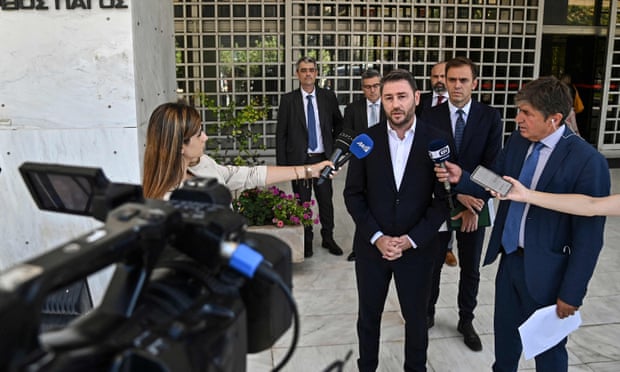Greek PM under pressure over tapping of opponent’s phone
Government accused of ‘darkest practices’ in eavesdropping scandal that evokes worst days of country’s military rule

An eavesdropping scandal that sees Greece’s intelligence chief and the head of his personal office resign within minutes; calls for further resignations amid revelations of “dark practices”, and a spy crisis likened to Watergate.
The Greek prime minister, Kyriakos Mitsotakis, is facing his toughest hour in office following the discovery that the mobile phone of his political opponent, the leader of the country’s third largest party, was tapped by order of EYP, the intelligence service that reports directly to his office.
“I never expected the Greek government to spy on me using the darkest practices,” the Pasok party head, Nikos Androulakis who is also a member of the European parliament, said in a televised address late on Friday as the extent of the espionage became apparent. “It is our democratic duty to protect the human rights and freedoms of Greek citizens. Today is a moment of truth for those whose arrogance and sense of impunity make them capable of anything.”
The prime minister’s Maximou office, only hours earlier, had revealed the resignation of Panagiotis Kontoleon, until then the much-revered EYP chief, for “incorrect actions”.
The news had followed the shock announcement that Mitsotakis’s nephew and most trusted aide, Grigoris Dimitriadis, had also stepped down – taking a bullet for his boss that was hoped would put the scandal to bed. Regarded as an eminence grise with wide-ranging powers, Dimitriadis had been Kontoleon’s point man in Maximou.

But by Sunday, as Mitsotakis acknowledged the wire-tapping had been a “huge and unforgivable mistake”, the resignations were being interpreted as an admission of guilt.
Likening the espionage scandal to Greece’s very own Watergate “that brutally insults our democracy”, the leftist former prime minister Alexis Tsipras vowed to leave no stone unturned in exposing the wrongdoing.
It was, he said, incumbent on the centre-right government to not only come clean about Androulakis – whose phone was monitored over a three-month period in the run-up to his election as Pasok leader last September – but others who reputedly had also been targeted.
“Instead of hypocritical apologies and lies, Mr Mitsotakis should say which other politicians and journalists have been followed,” said Tsipras, who heads the main opposition Syriza party. “This is not a huge and unforgivable mistake. It’s a huge scandal [that represents] the unforgivable arrogance of a regime, of a prime minister that thought no one could control him.”
The scandal, which has evoked the darkest days of military rule when opponents of the 1967-74 Colonels’ regime were regularly spied on, first broke when Androulakis revealed he had been informed by the European parliament of an attempt to bug his mobile phone with Predator malware.
The MEP made the announcement after availing himself of a cybersecurity service set up by the Strasbourg-based parliament for lawmakers to ensure their phones are not being illegally monitored. Among the most sophisticated spyware available, Predator is capable of unlocking access to encrypted messages and activating cameras and microphones on mobile devices.
Last week, Androulakis filed a complaint with prosecutors at the country’s supreme court detailing the wiretapping attempt.
Two Greek journalists – one covering migration, the other finance – have also taken legal action following allegations of similar illegal surveillance by a government heavily criticised internationally for restricting media freedom.
On 29 July, Kontoleon, the spy chief, admitted in a closed-door parliamentary committee hearing that the Greek intelligence service had monitored Thanassis Koukakis, the financial reporter, at the behest of a foreign intelligence service, according to MPs who were present.
Initially government officials denied the Predator malware revelations played any role in the resignations. But sources were then quoted as saying that Androulakis’s mobile phone had indeed been tapped at the request of overseas intelligence services – and with the permission of a public prosecutor – but, while legal and conducted using conventional software, the prime minister had no knowledge of the surveillance and “would have stopped it”.
Greek media at the weekend identified the foreign spy services as being Ukrainian and Armenian, with some outlets attributing the request to the Pasok leader’s connections with “shady persons acting on behalf of Chinese interests”.
The line of defence was immediately decried as a convoluted web of lies from an administration embroiled in its biggest crisis since assuming power in July 2019.
On Friday Androulakis urged the Greek parliament to establish an investigative committee to look into potential political responsibilities.
Mitsotakis, who controversially put EYP under Maximou’s control in one of his first acts in office, has said he will publicly address the nation on Monday. Sunday’s To Vima described him as saying: “I owe Nikos Androulakis an apology.”
The Harvard-trained leader, seen by some as a breath of fresh air after years of debilitating economic turmoil in Greece, has won plaudits with a reform agenda and managerial style more associated with the US than the Mediterranean. Since taking over he has appeared to relish the challenge of multiple crises.
But Mitsotakis, who faces re-election next year under a new electoral law that will make it near impossible for his New Democracy party to form a government – even if, as projected, it comes first – has also come under growing fire for a leadership style that leaves little space for criticism.
“Absolute power corrupts,” said the MEP Giorgos Kyrtsos, who was expelled from New Democracy for openly criticising the government and its treatment of the media earlier this year.
“Mitsotakis governs through Maximou, not the cabinet, in a system in which there are few checks and balances. His desire to control has ended up out of control. This spy scandal is a very big crisis and will raise further questions about the true extent of his European liberal credentials.”
… as you’re joining us today from Greece, we have a small favour to ask. Tens of millions have placed their trust in the Guardian’s fearless journalism since we started publishing 200 years ago, turning to us in moments of crisis, uncertainty, solidarity and hope. More than 1.5 million supporters, from 180 countries, now power us financially – keeping us open to all, and fiercely independent.
Unlike many others, the Guardian has no shareholders and no billionaire owner. Just the determination and passion to deliver high-impact global reporting, always free from commercial or political influence. Reporting like this is vital for democracy, for fairness and to demand better from the powerful.
And we provide all this for free, for everyone to read. We do this because we believe in information equality. Greater numbers of people can keep track of the events shaping our world, understand their impact on people and communities, and become inspired to take meaningful action. Millions can benefit from open access to quality, truthful news, regardless of their ability to pay for it.
Every contribution, however big or small, powers our journalism and sustains our future. Support the Guardian from as little as €1 – it only takes a minute. If you can, please consider supporting us with a regular amount each month. Thank you.


Δεν υπάρχουν σχόλια:
Δημοσίευση σχολίου